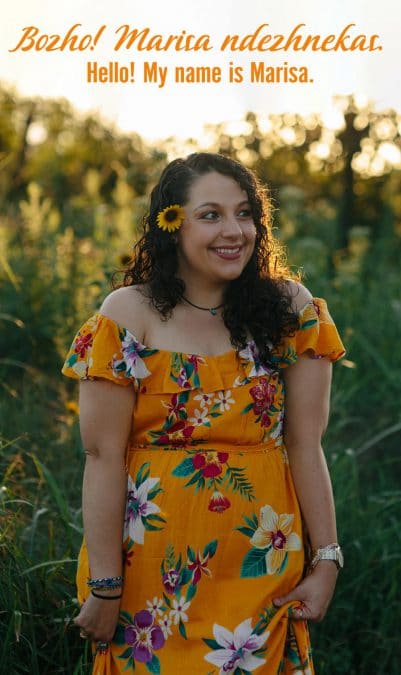By Marisa Mohi
The following is part of a series by CPN tribal member Marisa Mohi who is learning about the various ways Citizen Potawatomi can learn and connect with the Nation.
As an adult, it’s hard to imagine not being able to communicate. I can read. I can write. I can speak a language that those around me speak. This language is the key to my understanding of the world around me, and this language fundamentally informs my understanding of western culture.

But a problem I often run into when it comes to researching my heritage is that there’s a linguistic disconnect.
I’m sure this is something that a lot of Citizen Potawatomi feel. The language isn’t something that a lot of us hear each day, and for many, we’ve only ever read some of the words in the Hownikan but aren’t sure of pronunciations. Distance from the Cultural Heritage Center can seem like an immense barrier that prevents access to Tribal knowledge and heritage.
But that doesn’t have to be the case.
The online dictionary, at potawatomidictionary.com, is a great place to start learning more about the Potawatomi language. There is a word of the day on the front page, and users can peruse the dictionary in either Potawatomi or English, translating between the two. And the best part? There are audio recordings of the pronunciations of the Potawatomi words so you can actually hear the correct way to say it.
But, as a writer, I believe language is nothing without story, and luckily, there is a link to cultural teachings on potawatomi.org/language. There are videos about Potawatomi folklore, traditional stories, learning how to bead, Potawatomi cosmology and so much more.
Justin Neely is the director of language with the Tribe. According to Neely, things like stories, song, dance and recipes make us Potawatomi, “but the language is the thread which holds it all together.”
For me, creating the connection is all about becoming the next generation of ancestors. I want to be able to research more effectively, and this can mean following the genealogical lines and understanding the different names of the people that came before me. It also means learning the stories and how to tell them.
But language can also be a tool for determining tribal sovereignty. One of the questions that the federal government used to determine whether a tribe should be recognized was if the tribe had a unique, spoken language. Neely said, “In some ways, our very sovereignty as a nation is dependent on us having a language.”
It can be hard to create a cultural connection with your heritage when you don’t feel like you have access to it. Traditions are shaped by the way stories are told, and being able to use the language to tell those stories is key.
To Neely, “The language is like a window into the past. It shows what was important to our ancestors, shows our values and beliefs today, and it shows what will be important to us as Potawatomi people in the future.”
Marisa Mohi is a member of the Nadeau family and is a writer and writing instructor at the University of Oklahoma. You can follow her on Facebook or Twitter @themarisamohi. Her writing can be found at marisamohi.com.
